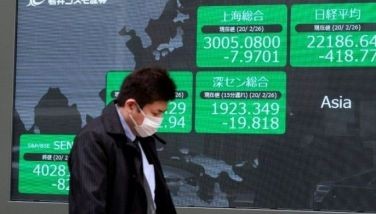Signing of RP-Japan eco pact seen this year
June 8, 2005 | 12:00am
NAGOYA, Japan – The signing of the Japan-Philippines Economic Partnership Agreement (JPEPA) is expected to take place before the end of the year, Philippine Ambassador to Japan Domingo L. Siazon Jr. said yesterday.
"Both parties have come to terms on most issues and the only thing still being discussed is the issue of the movement of people," said Siazon, referring to the number of qualified Filipino nurses and caregivers that Japan will accept annually to work in hospitals and in home care or retirement facilities.
"Japan wants to limit this number to 100 yearly but the Philippine government is asking that the number should be raised or be based on demand," said Siazon during an interview at the launching of the Department of Tourism-led Philippine Business Mission in Osaka. The Philippine roadshow also includes Nagoya and Tokyo.
The Japanese government had said it would allow entry of qualified nurses and certified careworkers if they satisfy certain requirements, such as learning the Japanese language to get their national licenses. This is on the assumption that the Philippine side will provide a similar framework to meet the Japanese interest.
After taking the national license examinations, qualified nurses will be given initial employment contract of up to three years, and four years for certified careworkers.
The Japanese government wants candidates who pass the Japanese language program to also enroll and complete caregiver courses. The certificate of completion of these courses will allow them to seek employment in established facilities.
"We can understand that because caring for the sick is hard enough as it is and could even be more complicated if there is a language problem, people’s health and lives are at stake," said Siazon, but added at the same time that the number of persons allowed annually should be increased.
"There is a big demand for nurses and caregivers, especially since there is a growing elderly population in Japan," said Siazon.
The Japanese government also wants to limit the number because it wants to control the number of Filipinos illegally staying and working in this country where an estimated 20,000 to 30,000 are unregistered.
Talks between the two countries started in 2002 and the agreement is almost a done deal except for the issue on the movement of persons and specific text of the agreement.
The JPEPA is intended to facilitate a freer trans-border flow of goods, persons, services and capital between Japan and the Philippines. It also aims to enhance a comprehensive economic partnership, which includes intellectual property, competition policy, improvement of business environment and bilateral cooperation in such fields as human resources development, information and communications technology and small and medium enterprises.
The Japanese government has agreed to either eliminate or reduce gradually, the tariffs on Philippine agricultural,forestry and fishery products being shipped to Japanese ports.
Siazon said the Philippine agriculture sector stands to gain from JPEPA, since Japan is now the biggest market of local agricultural producers. He noted that 95 percent of Japan’s pineapple and banana imports come from the Philippines, while about 45 percent of its papaya requirements are sourced from Mindanao-based producers. By next year, the Philippines is expected to dislodge Thailand as the biggest supplier of fresh okras to Japan as buyers shift to the more cost-competitive and better-quality okra grown by Tarlac farmers in Luzon.
As a concession, the Philippine government aceeded to Japan’s insistence that its industrial products such as automative parts be allowed to enter the domestic market at preferential or reduced tariffs.
On customs procedures, both countries will promote information exchange and cooperation for the purpose of facilitating trade through simplification and harmonization of customs procedures and effective enforcement against illicit trafficking of goods.
JPEPA also includes provisions concerning national treatment, most-favored-nation treatment and performance requirement prohibitions for the liberalization of investment and enhance transparency by specifying all exceptions to these provisions. Furthermore, provisions concerning protection of investment will also be included.
"Both parties have come to terms on most issues and the only thing still being discussed is the issue of the movement of people," said Siazon, referring to the number of qualified Filipino nurses and caregivers that Japan will accept annually to work in hospitals and in home care or retirement facilities.
"Japan wants to limit this number to 100 yearly but the Philippine government is asking that the number should be raised or be based on demand," said Siazon during an interview at the launching of the Department of Tourism-led Philippine Business Mission in Osaka. The Philippine roadshow also includes Nagoya and Tokyo.
The Japanese government had said it would allow entry of qualified nurses and certified careworkers if they satisfy certain requirements, such as learning the Japanese language to get their national licenses. This is on the assumption that the Philippine side will provide a similar framework to meet the Japanese interest.
After taking the national license examinations, qualified nurses will be given initial employment contract of up to three years, and four years for certified careworkers.
The Japanese government wants candidates who pass the Japanese language program to also enroll and complete caregiver courses. The certificate of completion of these courses will allow them to seek employment in established facilities.
"We can understand that because caring for the sick is hard enough as it is and could even be more complicated if there is a language problem, people’s health and lives are at stake," said Siazon, but added at the same time that the number of persons allowed annually should be increased.
"There is a big demand for nurses and caregivers, especially since there is a growing elderly population in Japan," said Siazon.
The Japanese government also wants to limit the number because it wants to control the number of Filipinos illegally staying and working in this country where an estimated 20,000 to 30,000 are unregistered.
Talks between the two countries started in 2002 and the agreement is almost a done deal except for the issue on the movement of persons and specific text of the agreement.
The JPEPA is intended to facilitate a freer trans-border flow of goods, persons, services and capital between Japan and the Philippines. It also aims to enhance a comprehensive economic partnership, which includes intellectual property, competition policy, improvement of business environment and bilateral cooperation in such fields as human resources development, information and communications technology and small and medium enterprises.
The Japanese government has agreed to either eliminate or reduce gradually, the tariffs on Philippine agricultural,forestry and fishery products being shipped to Japanese ports.
Siazon said the Philippine agriculture sector stands to gain from JPEPA, since Japan is now the biggest market of local agricultural producers. He noted that 95 percent of Japan’s pineapple and banana imports come from the Philippines, while about 45 percent of its papaya requirements are sourced from Mindanao-based producers. By next year, the Philippines is expected to dislodge Thailand as the biggest supplier of fresh okras to Japan as buyers shift to the more cost-competitive and better-quality okra grown by Tarlac farmers in Luzon.
As a concession, the Philippine government aceeded to Japan’s insistence that its industrial products such as automative parts be allowed to enter the domestic market at preferential or reduced tariffs.
On customs procedures, both countries will promote information exchange and cooperation for the purpose of facilitating trade through simplification and harmonization of customs procedures and effective enforcement against illicit trafficking of goods.
JPEPA also includes provisions concerning national treatment, most-favored-nation treatment and performance requirement prohibitions for the liberalization of investment and enhance transparency by specifying all exceptions to these provisions. Furthermore, provisions concerning protection of investment will also be included.
BrandSpace Articles
<
>
- Latest
- Trending
Trending
Latest
Trending
Latest
Recommended




























